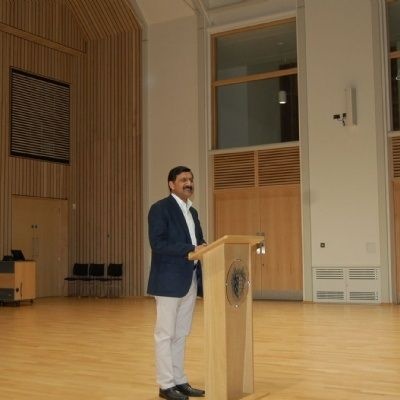King's High welcomes Malala's father, Ziauddin Yousafzai, to spend a day with pupils

King’s High invited Malala’s father, Ziauddin Yousafzai, to spend the day at school. He gave a moving speech on peace, women’s rights and education at an AmnesTEA, organised by King’s High and Warwick School’s joint Amnesty Group. An education activist and teacher, Ziauddin Yousafzai is best known as the father of the Nobel Laureate, Malala, who was shot by the Taliban for upholding the education rights of girls. He said: ‘Malala used to be known as my daughter, but now I'm known as her father - and I’m proud of it.’ Malala credits her father with being the inspiration behind her protest.
Mr Yousafzai described his own experiences teaching in Swat, and said: ‘This young girl with a voice was more powerful than the bombs of the Taliban. That’s why they wanted to finish her. Silence her. She ended up talking for the 130 million girls worldwide with no access to school.’
He continued: ‘Growing up in Pakistan, I was a feminist before I knew the word. Education transformed me, and gave me the beautiful values of tolerance and fairness. But when you fight Patriarchy as a man, the first thing you come up against is yourself.’ Throughout the day, he held Q and A sessions with King’s High’s National Council of Young Women group, the joint King’s High and Warwick School Amnesty group, and the school’s team of Wellbeing Ambassadors. He told girls he ‘fell in love with Malala’s shining, star-like eyes as a newborn’ and recounted stories from her childhood: how Malala would deliver speeches ‘to the empty chairs at school’, and her keenness as a student: ‘If she was late for school, she would make her mother go in with her to explain why.’
He spoke movingly of Malala’s ‘wisdom, patience, and resilience. Through all her life-saving and reconstructive surgery, she never once complained.’ He added: ‘She is also very funny. So funny. She teases me a lot. Before she left to study at Oxford University, she asked if I was worried about her mixing with boys. I told her, rather pompously, ‘I trust you, darling.’ She laughed, and said ‘Don’t trust me!’.
He spoke about the differences the Malala Fund, which he co-founded, has made worldwide. In Nigeria, which he described as one of the three worst places (alongside India and Pakistan) for girls’ education, the fund worked to change laws, which has allowed 80,000 girls access to education. He concluded: ‘Education is the most powerful equaliser. Whenever you see injustice, you must raise your voice. Don’t wait for others. Injustice is the mother of conflicts, so you must fight against it.’
Richard Nicholson, Head Master, commented: ‘It was an honour to welcome Ziauddin Yousafzai to King’s High. He and his daughter continue to shine a light for girls around the world, and it was an experience our girls, and whole school community, will never forget.’
